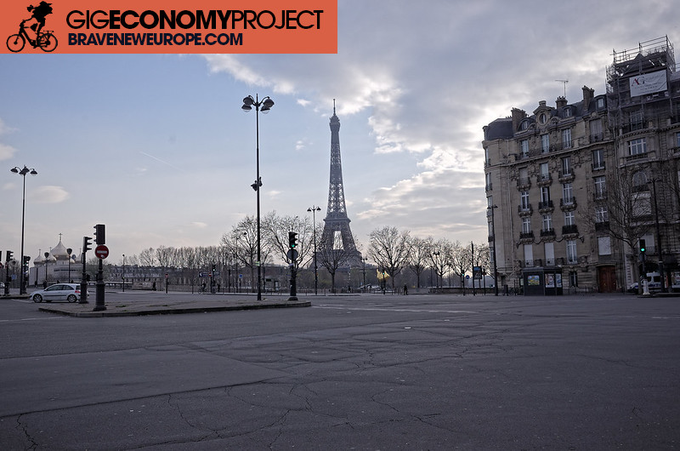The Gig Economy Project analyses ground-breaking research on the impact of lockdown on the financial security, health and mental well-being of gig economy workers in France.
Ben Wray is a freelance journalist leading BRAVE NEW EUROPE’S Gig Economy Project. He also produces a morning newsletter called Source Direct on Scottish politics, which you can sign-up to here: https://sourcenews.scot/mailing-list/
This series of articles concerning the Gig Economy in the EU was made possible thanks to the generous support of the Lipman-Miliband Trust
![]()

We know workers in the gig economy were hit hard by the pandemic and lockdown, but there has been little detailed evidence about exactly how hard. A 10 September study on the impact of the pandemic on gig workers in France is one of the first pieces of academic research to be published on this issue.
Bénédicte Apouey, Alexandra Roulet, Isabelle Solal and Mark Stabile used original survey and interview data on precarious workers, especially gig economy workers, in urban parts of France between 9 March and 9 April, pre and post France’s national lockdown on 17 March. The study examines how gig workers “balance financial uncertainty, health risks and mental well-being” in a situation of “extreme precarity”. The results provide both quantitative and qualitative data on how gig workers cope with lockdown.
The gig economy in France remains relatively small, at around one per cent of total employment, but is growing quickly in size. The majority of gig workers sampled were riders or drivers for firms like Deliveroo and Uber, but also included home care workers, cleaners, ’cloud’ workers, tutors, graphic designers and more.
Like in other countries, French gig workers could not access furlough or unemployment benefit during the pandemic due to their ‘self-employed’ status. The only financial support they had available to them was a one-off payment of €1500 for “micro-entrepreneurs”. And of course the health & safety risks were borne by them, not the digital platform they were working on behalf of.
Key findings
What were the key results? In terms of work and income, the headline figures are that 56 per cent of those surveyed stopped working during lockdown, with a 28 per cent drop in income on average.
Gig economy drivers experienced a 21-23 per cent greater fall in income than the average precarious worker, but starting from a higher base income. This was mainly driven by the large number of gig drivers who stopped working altogether, often because of health concerns.
“For my part, I quit working as an Uber driver since yesterday,” a driver said. “No protection, and no solution with regard to our safety. I’m in contact all day with customers. I have three children at home, I can’t afford to get sick.”
For some home care workers, lockdown stripped them of their occupation altogether for the duration of lockdown.
“For my part, there’s no more work since it’s performed in people’s homes, so no more income,” one babysitter said.
A common theme in responses was financial anxiety about the future, specifically raising the lack of government welfare support for independent contractors.
“Unfortunately our status as independent workers is precarious, that’s our daily lot. No unemployment benefits or sick leave,” one driver said.
While 25 per cent of drivers received financial compensation, just 3.3 per cent of riders did. 20 per cent of riders said they couldn’t pay the rent or mortgage during lockdown, while 10 per cent of drivers said the same.
The study found significant differences between those who can work remotely and geographically-tethered gig workers. Of those who did not stop working outside during lockdown, there was on average a 23 per cent fall in income, compared to a 2 per cent fall in income for remote workers.
Mental well-being
Interestingly, while riders were much more likely to have continued work during lockdown, they were not more likely to experience more stress and anxiety than other precarious workers, and in fact reported significantly lower stress levels overall.
There are different ways of interpreting this. For one thing, those riding bikes all day for a living are likely to be generally physically and thus mentally healthier. Also, being one of the few workers to be outside in the urban space during lockdown may have had a certain liberating effect compared to being stuck indoors, even with the health risks involved. That does not necessarily mean being an independent contractor while riding a bike is positive for one’s mental health.
Drivers and riders interviewed were asked about the effect of their job on mental health, and identified “both positive and negative psychosocial experiences”.
“On the one hand my job as a biker brings me physical and emotional well-being, and all this despite the negative aspects – pollution and danger – of the road in an urban environment. And I’d say that in my work there is a type of stress induced by certain platforms like Uber by its rating system,” one rider said.
This is consistent with other research on the contradictory psychology of gig work, where workers enjoy the distance they have from a boss while at the same time feeling different forms of social pressure, such as from customers through the ratings system.
Conclusion
As Europe teeters on the brink of new lockdowns, gig economy workers once again face being at the sharp end of financial and health insecurity. This research proves that it was not hyperbole to talk about an especially dramatic impact of lockdown on workers with no labour rights and social protections, a problem for which there is no excuse for parliaments across Europe to now address as the pandemic crisis rumbles on.
The study, ‘Gig Workers During the COVID-19 Crisis in France: Financial Precarity and Mental Well-Being’, can be accessed here.


Be the first to comment